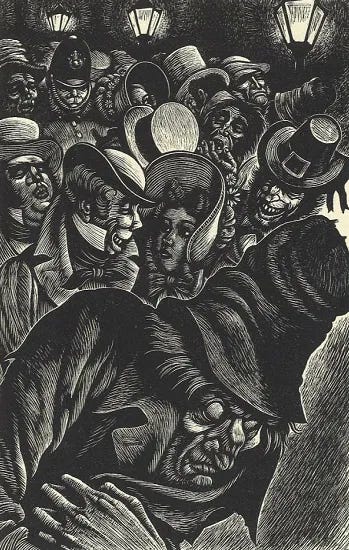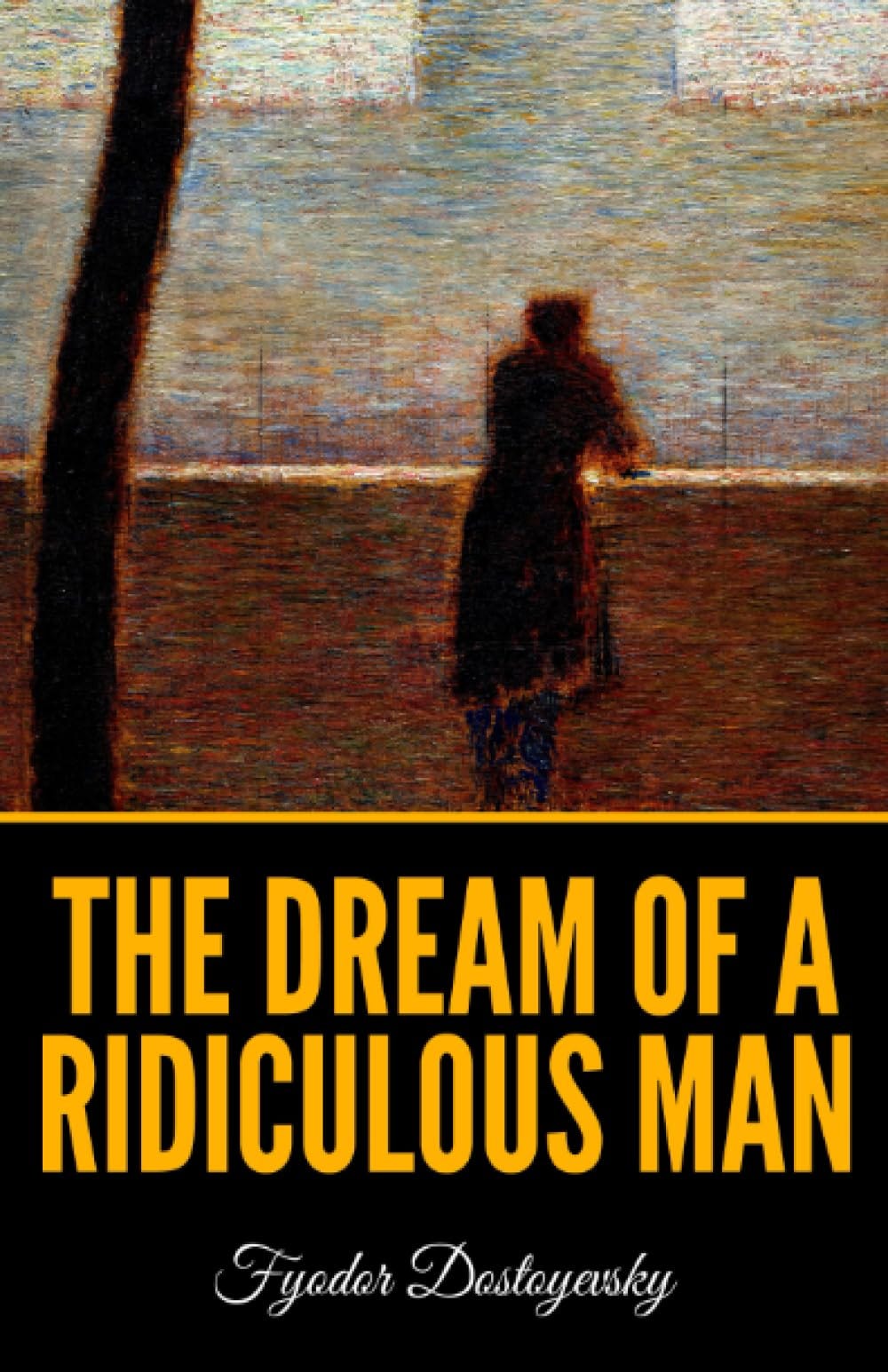Dostoevsky’s Ridiculous Man Meets Nietzsche and Marx
Do these three nineteenth century thinkers cross paths in alienation?
A frequent occurrence in the fiction of Fyodor Dostoevsky is suicide. Concerned with widespread loss of faith and the questioning of religious institutions, Dostoevsky responded in his fiction with nihilistic characters, who were themselves tormented, or concerned with, moral, religious, and philosophical dilemmas. One example of this is in the short story The Dream of a Ridiculous Man. Though God is not mentioned explicitly in the unnamed ridiculous man’s narrative, his succumbing to suicidal thoughts is a direct response to crises in faith. For the ridiculous man, ever wandering the streets of St. Petersburg, there is an overwhelming sense that nothing matters, something that reflects a broader theme in Dostoevsky’s work, a theme that subsequently reflects the real-world concerns of the author himself, that of a society moving away from traditional Christianity into nihilism.
Five years after the publication of The Dream of a Ridiculous Man, Friedrich Nietzsche declared the death of God in his work, The Gay Science. For Nietzsche, the death of God was not a literal event but a metaphor for the collapse of traditional values and religious beliefs that had provided structure and meaning for centuries. This "death" left humanity in a state of nihilism, where, in Nietzsche’s words, "everything is permitted" because there are no longer any absolute moral truths to guide behaviour.
In contrast to Dostoevsky, Nietzsche saw this not only as a crisis but also an opportunity. Without God, humanity was free to create its own values, to redefine meaning on its own terms. But this freedom came with a cost: the profound alienation that accompanies the loss of a higher purpose. Much like Dostoevsky’s ridiculous man, who feels cut off from the himself, Nietzsche’s vision of modern humanity is one of individuals struggling to find meaning.
Both Dostoevsky and Nietzsche are concerned with the breakdown in religious institutions and the dangers of nihilism. For Dostoevsky, the questioning of God and the loss of faith were a catastrophe. Yet for Nietzsche, there lay an opportunity to move beyond the regression and authoritarianism of organised religion.

Marx’s Theory of Alienation
While Nietzsche and Dostoevsky focused on the existential and spiritual dimensions of alienation, Karl Marx approached the concept from a different angle. For Marx, alienation was a material and social condition rooted in the structure of capitalist society. In his analysis, alienation occurs when workers are disconnected from the products of their labour, from the labour process itself, from their fellow workers, and ultimately from their own human essence.
In Marx’s view, capitalism reduces human beings to mere cogs in the machine, stripping away their individuality and their potential for self-actualisation. This alienation is not just economic but existential - capitalism, by commodifying human life, leads to a deep sense of disconnection and meaninglessness.
In many ways, the ridiculous man’s alienation in Dostoevsky’s story mirrors this Marxist understanding. He feels estranged not only from his fellow humans but from his own sense of self. Though Marx focused primarily on labour, the broader implications of his theory—alienation from the self, from society, and from meaning—are strikingly similar to the themes Dostoevsky explores in The Dream of a Ridiculous Man. Both point to a world in which individuals are isolated and adrift, unable to connect with others or with any deeper sense of purpose.
The Flâneur as a Figure of Alienation
The ridiculous man also embodies the figure of the flâneur, a literary archetype popular in 19th-century literature. The flâneur is a solitary wanderer, an observer of modern urban life who roams the streets purposely aimless. The flaneur is a symbol of alienation, someone who exists on the margins of society, disconnected from its rhythms and unable to participate fully in its life.
The wandering of the ridiculous man reflects his inner estrangement - he is not just lost in the physical sense, but in the spiritual and existential sense as well. He is a man who feels utterly out of place in the world, disconnected from others and from himself. In this way, the flâneur becomes a powerful symbol of individual alienation.

Alienation from the Self
The culmination of alienation in both Dostoevsky’s and Nietzsche’s work is the alienation from the self. In Nietzsche’s philosophy, the death of God forces individuals to confront the void left behind. Without an external moral authority, people must create their own meaning, but this task is fraught with uncertainty and despair. The ridiculous man’s declaration that his life is absurd and meaningless echoes this existential crisis. He is cut off from any sense of purpose, and his decision to commit suicide reflects the ultimate form of alienation - alienation from his own existence.
Marx’s theory of alienation also touches on this idea. The final stage of alienation, according to Marx, is alienation from one’s species-being - the essence of what it means to be human. Under capitalism, individuals are unable to realise their true potential because they are trapped in a system that reduces them to mere instruments of production. This alienation from the self is not unlike the ridiculous man’s sense of absurdity and disconnection from his own humanity.
A Modern Condition
The alienation described by Dostoevsky, Nietzsche, and Marx remains as relevant today as it was in the 19th century. In our own time, the sense of disconnection continues to shape the modern condition. Whether it is the spiritual alienation, the existential crisis of creating meaning in a society that offers none, or the material alienation of life under capitalism, the themes explored in The Dream of a Ridiculous Man resonate powerfully with contemporary life.
Ultimately, Dostoevsky’s ridiculous man embodies a profound truth about alienation. His journey from despair to a fleeting moment of epiphany - where he dreams of a utopian world free from the absurdity of modern life - serves as a reminder of the deep, often painful search for meaning in a society that seems determined to deny it. Like Marx and Nietzsche, Dostoevsky offers no easy answers, but his exploration of alienation remains a powerful reflection of the struggles that define the human experience.






Seems that D.'s more minor, lesser-read works are enjoying an unlikely vogue. I'll have to finally go back and read more of them.
I am fascinated the philosophical switch which D. performed so balletically after his imprisonment. Interestingly, this switch is less evident in his fiction than his awful, to me almost-unreadable nonfiction. It's a credit to his literary bona fides that his fiction remains as fascinating and relevant as it does to readers across the political spectrum.
Thanks for the analysis. I agree that neither he nor N. offer easy answers but I believe that we are still living in the shadow of these two. Interesting that you bring Marx in, tho to be honest I haven't spent as much time with him. Alienation and all that, of course. I've never thought of the two of them in relation to M. Of course, they'd all be disgusted with one another, probably. (Excepting N.'s great admiration for D., "the great psychologist," of course.)
Thanks for sharing.
Clayton @ amokxy@gmail.com